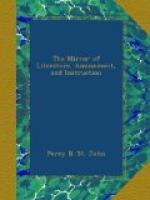Llundain.
CYMMRO.
[5] Vol. iv. p. 10 and 50.
[6] Welsh name of Somersetshire.
* * * * *
BATHING—ANCIENT AND MODERN BATHS.
Perhaps neither of the exercises that are indispensable to the health and comfort of man has so kept pace with his progressive improvement as bathing; and though of late years this effectual promoter of cleanliness has not in some parts of the world been sufficiently attended to, yet the custom is by no means on the decrease; nor can any fear be entertained, with propriety, that so excellent and so natural an expedient should ever be suffered to decline, from want of consideration of its benefits and advantages. But it must be owned, that while bathing in many countries is resorted to as a matter-of-course affair among all classes, in England it is in a great measure disregarded by most of the middle classes, and almost entirely so by those in the lower station of life, who perhaps require this exercise more than their richer neighbours.
A medical writer of the present day observes, with some grounds for complaint, that while “in almost all countries, both in ancient and modern times, whether rude or civilized, bathing was a part of the necessary and everyday business of life, in this country alone, with all its refinements in the arts which contribute to the happiness or comfort of man, and with all its improvements in medical science and jurisprudence, this salutary and luxurious practice is almost entirely neglected."[7] But in many countries, particularly in the east, bathing is as much resorted to as ever; and its really powerful effects in invigorating the frame and promoting the porous secretions, (without which life itself cannot be long continued,) require only to be once known to be persevered in.




